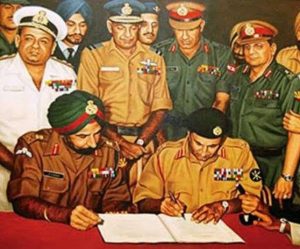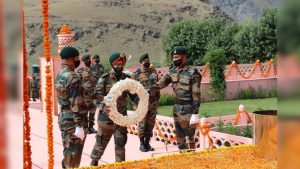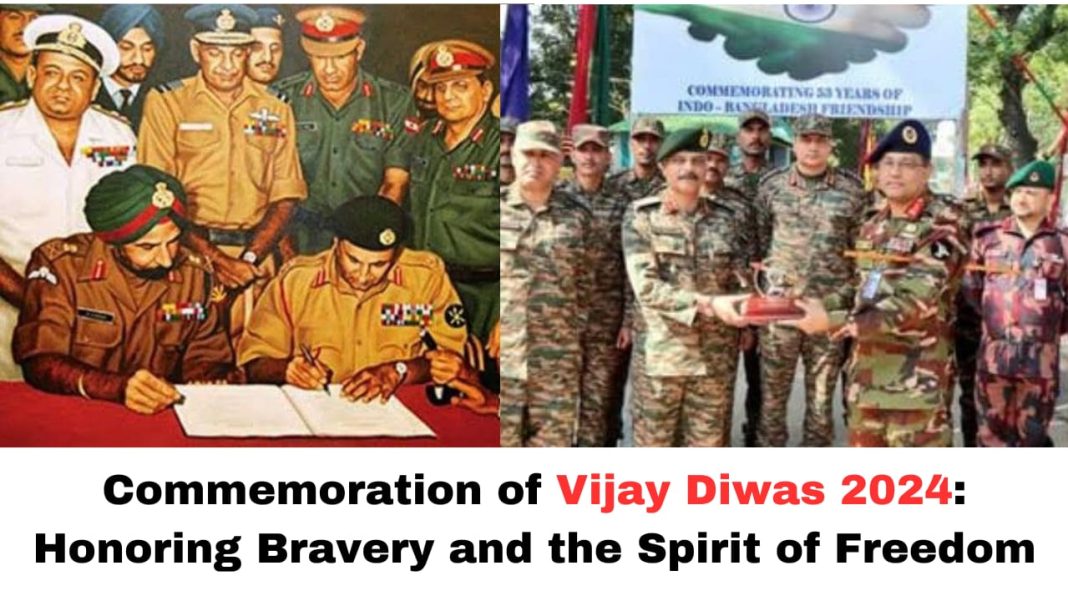Digital News Guru Current Affairs Desk:
On December 16, 2024, India commemorates Vijay Diwas, a day of immense national pride and historical significance. This event marks the 53rd anniversary of India’s decisive victory in the 1971 Indo-Pak War, which resulted in the liberation of Bangladesh. Vijay Diwas is a solemn yet celebratory occasion to honor the courage and sacrifices of the Indian armed forces, showcasing the enduring importance of justice, freedom, and human rights.
The Historical Context of Vijay Diwas
The roots of Vijay Diwas lie in the tumultuous events of 1971, when political, cultural, and economic tensions between East Pakistan (now Bangladesh) and West Pakistan culminated in civil unrest. East Pakistan’s demands for autonomy were met with violent repression under the brutal military campaign “Operation Searchlight,” which sought to crush Bengali aspirations for independence. The crackdown led to mass atrocities, including genocide and the displacement of millions of refugees into India.

Faced with a growing humanitarian crisis, India initially provided refuge and support to millions fleeing the violence. However, the conflict escalated into a full-scale war on December 3, 1971, when Pakistan launched preemptive airstrikes on Indian military bases. India’s response was swift and decisive, with its armed forces launching a coordinated assault in collaboration with the Mukti Bahini, the Bangladeshi freedom fighters. The war lasted 13 days, culminating in the surrender of 93,000 Pakistani troops in Dhaka on December 16, 1971. This remains one of the largest military surrenders in modern history and led to the creation of Bangladesh as an independent nation.
Significance of Vijay Diwas
Vijay Diwas is more than a remembrance of a military victory; it symbolizes India’s commitment to justice, human rights, and the liberation of oppressed communities. The war underscored India’s ability to navigate complex geopolitical challenges and highlighted its military prowess and strategic leadership. For Bangladesh, it represents freedom from decades of systemic oppression and the birth of a new, sovereign identity.
Tributes and Celebrations
The commemoration of Vijay Diwas in 2024 carries profound emotional and historical weight. Across India, homage is paid to the soldiers who laid down their lives during the conflict. Memorials such as the Amar Jawan Jyoti in Delhi host solemn wreath-laying ceremonies, with political leaders, defense personnel, and citizens gathering to honor the fallen heroes.

In Kolkata and Dhaka, joint ceremonies by Indian and Bangladeshi officials emphasize the shared history and enduring bond between the two nations. Military parades, exhibitions, and cultural programs are organized to showcase the valor of the armed forces and the significance of the 1971 victory.
The Indian military also conducts reenactments of key battles from the war, offering insights into the strategy and bravery displayed by soldiers. Cultural performances, including patriotic songs, dance, and dramatic reenactments, bring the stories of heroism to life for audiences across generations.
2024 Highlights: Strengthening Indo-Bangladesh Ties
This year’s Vijay Diwas celebrations hold special significance as India and Bangladesh deepen their diplomatic and cultural ties. Leaders from both nations are participating in commemorative events, reaffirming the shared values that emerged from the 1971 liberation struggle. Joint tributes by military contingents and cultural exchanges reflect the ongoing collaboration between the two neighbors.
The 2024 observance also coincides with discussions about regional security and cooperation, with India and Bangladesh working to address shared challenges such as border management and counterterrorism. These initiatives underscore the importance of Vijay Diwas as not only a historical event but also a foundation for enduring peace and partnership.
Reflections on Sacrifice and Freedom
Vijay Diwas serves as a poignant reminder of the cost of freedom and the resilience of a united effort against oppression. It inspires citizens to honor the sacrifices made by the armed forces while reflecting on the broader lessons of the war. The victory in 1971 was achieved not only through military might but also through moral conviction and the steadfast resolve to uphold justice.
The war showcased the leadership of figures like Field Marshal Sam Manekshaw, whose strategic brilliance and empathetic leadership were instrumental in India’s success. Similarly, the valor of the soldiers, who fought in harsh conditions with unwavering determination, continues to be a source of inspiration for future generations.

Cultural Legacy and Future Perspectives
The cultural programs associated with Vijay Diwas are not merely celebratory but also educational. They serve as a bridge connecting younger generations to the sacrifices and struggles of the past. Events such as theatrical productions and documentaries on the war ensure that the legacy of 1971 remains vibrant and relevant.
Moreover, Vijay Diwas encourages discussions about India’s role as a regional power and a global advocate for human rights. By commemorating the victory, India reiterates its commitment to supporting oppressed populations and fostering stability in the region. Bangladesh, too, uses the day to highlight its journey from struggle to sovereignty, strengthening its identity on the global stage.
Conclusion
The commemoration of Vijay Diwas is a celebration of courage, resilience, and the enduring spirit of freedom. As India observes this day in 2024, it pays tribute to the heroes of 1971 and reflects on the profound impact of their sacrifices. The occasion is a reminder that the values of justice, unity, and liberty transcend time, serving as guiding principles for the present and future.
By celebrating Vijay Diwas, both India and Bangladesh honor their shared history and reaffirm their commitment to a peaceful, collaborative future. It is a day that unites people across borders, reminding them that the spirit of freedom is indomitable and worth cherishing.
You May Also Read: Hampi: A UNESCO World Heritage Site Preserving the Legacy of the Vijayanagara Empire








